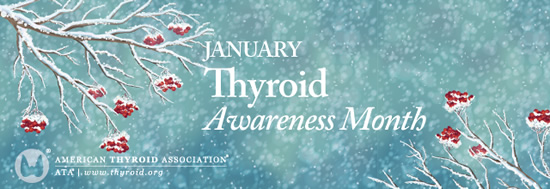
Clinical Thyroidology for the Public summarizes selected research studies discussed in the previous month’s issue of Clinical Thyroidology, an official publication of the American Thyroid Association. Editor-in-chief, Alan Farwell, MD, FACE
Volume 17 Issue 1
Available in pdf format for saving and printing and Web page format for viewing online
PDF Format for Saving and Printing
Clinical Thyroidology for the Public Volume 17 Issue 1 (PDF file, 2.32 MB)
TABLE OF CONTENTS – Web Format
THYROID AND PREGNANCY
Women with hypothyroidism taking levothyroxine may need to be more closely monitored before pregnancy
Current American Thyroid Association guidelines recommend that women who are treated with levothyroxine for hypothyroidism and planning for pregnancy should have their TSH levels checked before becoming pregnant and to have their levothyroxine dose adjusted to keep TSH below 2.5mIU/L. In general, the levothyroxine dose needs to be increased during pregnancy. This study assessed how many women with known hypothyroidism had TSH levels measured and how many of these women had normal thyroid levels within the year before pregnancy.
Tena Vivó G et al 2023 Description of thyroid disorders the year before conception: A population-based study. Front Endocrinol (Lausanne) 14:1236505. PMID: 37818089.
HYPOTHYROIDISM
Thyroid hormone dosing after thyroid surgery: Is there a better way?
Post-surgical hypothyroidism requires thyroid hormone replacement after the procedure for the rest of their lives. Calculation of the dose of the levothyroxine to begin after a thyroidectomy can often be a challenge. This study was done to look at the outcome of thyroid hormone replacement by weight based dosing or a computer assisted algorithm to look for any potential differences in these approaches.
Barrio M et al 2023 Computer-assisted levothyroxine dose selection for the treatment of postoperative hypothyroidism. Thyroid 33:547–555. PMID: 37084246.
HYPERTHYROIDISM .
Can thyroidectomy be performed safely before a euthyroid state is achieved?
American Thyroid Association guidelines suggest that hyperthyroid patients should have their thyroid levels in the normal range prior to surgery to prevent thyroid storm. However, despite strong recommendations, there is very little clear evidence for this. This study aimed to assess safety and efficacy of thyroidectomy in patients while still in the hyperthyroid state.
Fazendin J et al 2023 Surgical treatment of hyperthyroidism can be performed safely before a euthyroid state is achieved. Thyroid 33:691–696. PMID: 37253173.
THYROID NODULES
Can artificial intelligence assist the diagnosis and management thyroid nodules?
Ultrasound is the best way to evaluate a nodule to determine the risk of cancer and whether a biopsy is needed. Deep learning AI could potentially have a more accurate diagnosis of thyroid nodules and cancer than experienced radiologists when used with important ultrasound characteristics. This multicenter study evaluated the use of a deep learning–based AI model to improve diagnosis of thyroid cancer by ultrasound images and compared the results with evaluation in clinical practice by physicians with different levels of experience.
Ha EJ et al 2023 Artificial intelligence model assisting thyroid nodule diagnosis and management: A multicenter diagnostic study. J Clin Endocrinol Metab. Epub 2023 Aug 25. PMID: 37622451.
THYROID CANCER
Thermal ablation for treatment of recurrent papillary thyroid cancer
One way of treating recurrent thyroid cancer without surgery is to use heat to try and destroy the involved lymph node(s) (thermal ablation). There are three different ways that heat is delivered by the inserted needle: radiowave-based heat (radiofrequency ablation, RFA), microwave-based heat and laser-based heat. The authors of the research described here sought to study the effectiveness and safety of thermal ablation for treatment of recurrent thyroid cancer.
Zhang X et al 2022 Ultrasonography-guided thermal ablation for cervical lymph node metastasis of recurrent papillary thyroid carcinoma: Is it superior to surgical resection? Front Endocrinol (Lausanne) 13:907195. PMID: 35832431.
HYPOTHYROIDISM
Increased FT4 and incompletely suppressed TSH levels are mainly related to levothyroxine use
TSH levels are opposite to FT4 levels. The authors of this study noticed that when they measured thyroid levels in their hospital, in many patients there was an unexpected pattern: the patients had high FT4 levels even though their TSH levels were normal, not low, as it would be expected. Since they had just started using a new FT4 assay, this study was done to compare the FT4 levels with both the new assay and the old assay to determine what was the cause of these results.
Jansen HI et al 2023 Increased fT4 concentrations in patients using levothyroxine without complete suppression of TSH. Endocr Connect 12(4):e220538. PMID: 36762702.



